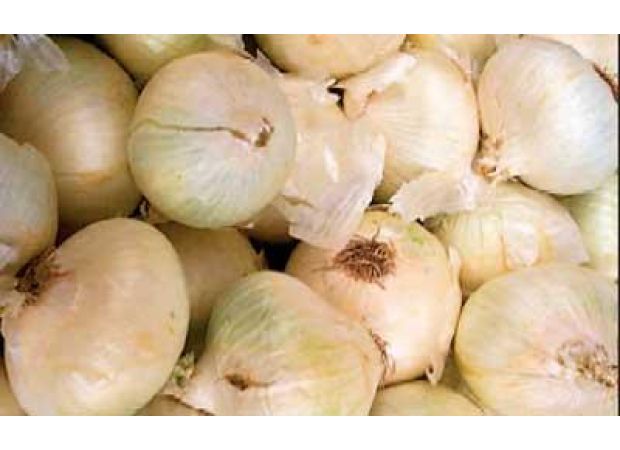Farm in Colorado recalls onions possibly related to recent E. coli outbreak at McDonald's.
Harmless to cows, but dangerous to people - the specific E. coli strain responsible for the current outbreak is causing serious illness.

A Colorado farm has recently issued a recall notice for its onions, which may have been sold to McDonald's before the fast-food chain's E. coli outbreak. Sadly, this outbreak has resulted in one death in Colorado and has made at least 49 people across the nation sick.
The farm in question, Taylor Farms, is based in California but also has operations in Colorado. They have recalled whole and diced yellow onions due to concerns of possible E. coli contamination. This recall was announced on Wednesday.
According to McDonald's, they had purchased onions from Taylor Farms and distributed them to locations in areas affected by the outbreak. However, distributor U.S. Foods has stated that the recalled vegetables did not go to the fast-food chain. Taylor Farms has yet to respond to these allegations, and the U.S. Department of Agriculture is investigating the farms and facilities involved.
Federal officials are currently looking into slivered onions and quarter-pound beef patties as potential sources of the outbreak. As a precaution, McDonald's has removed Quarter Pounders from their menu in Colorado and other affected states. This is because most of the individuals who were interviewed about their food consumption reported having eaten this type of hamburger in the days before they fell ill.
The Centers for Disease Control and Prevention has reported that out of the 49 people who have gotten sick nationwide after eating at McDonald's, 26 of them live in Colorado. Ten of these individuals have needed hospital care, and sadly, one person has died in Mesa County. This individual had pre-existing health conditions.
The companies responsible for supplying and handling the contaminated ingredients could potentially face legal consequences. In fact, a Colorado man named Eric Stelly has already sued McDonald's for a minimum of $50,000 after becoming ill with E. coli after eating at one of their locations in Greeley on Oct. 4. Although Stelly visited the emergency room, he was not kept overnight. His attorney has stated that he is still recovering as of Wednesday.
While most people who are infected with E. coli recover without specific treatment, children under 5, adults over 65, and individuals with compromised immune systems are at a higher risk of complications. The bacteria can produce a toxin that causes abdominal pain, vomiting, bloody diarrhea, and, in rare cases, bloodstream infections or kidney damage.
In response to the McDonald's E. coli outbreak, other national restaurant chains have temporarily stopped using fresh onions. Colorado-based chain Illegal Pete's has stated that they were one of the restaurants that had purchased the recalled onions and were throwing them out. Burger King has also announced that they are replacing the recalled onions with ones from another supplier.
Other restaurants affected by the recall include Taco Bell, Pizza Hut, and KFC, all of which have had to dispose of their onions in locations that received potentially contaminated shipments. Yum Brands, the parent company of these chains, has stated that they are following guidance from regulators and their suppliers.
Restaurant Brands International, which owns Burger King, has announced that 5% of its restaurants use onions distributed by Taylor Farms' Colorado facility. However, they have also stated that their employees wash, peel, and slice the onions themselves after receiving whole, fresh onions. As a precaution, the company has asked the restaurants that received onions from the Colorado facility to dispose of them, and they are currently restocking with onions from other suppliers.
Bill Marler, an attorney who specializes in foodborne illness cases, has stated that Taylor Farms had to recall bags of diced celery and onions in 2015 after an E. coli outbreak in people who had eaten chicken salad from Costco. It is worth noting that contaminated onions also caused a salmonella outbreak in 2023, which resulted in at least 80 people becoming sick, 18 being hospitalized, and one death. This outbreak was caused by a different company, Gills Onions.
Marler has also mentioned that in almost all foodborne illness outbreaks, the farms and restaurants involved did not intentionally sell contaminated products. Rather, something in the food safety process broke down. This could be due to water contaminated by cow feces, such as an irrigation ditch catching waste from a nearby feedlot. The strain of E. coli involved in the current outbreak is not harmful to cattle but can cause severe symptoms in humans. It is responsible for about 74,000 infections, 2,000 hospitalizations, and 61 deaths in the U.S. each year, according to the CDC.
In summary, the E. coli outbreak linked to McDonald's has caused widespread concern and has resulted in one death in Colorado. Investigations are ongoing to determine the source of the contamination, and other restaurant chains have taken precautions by temporarily stopping the use of fresh onions. Consumers are urged to stay informed and take necessary precautions to avoid potential illness.


